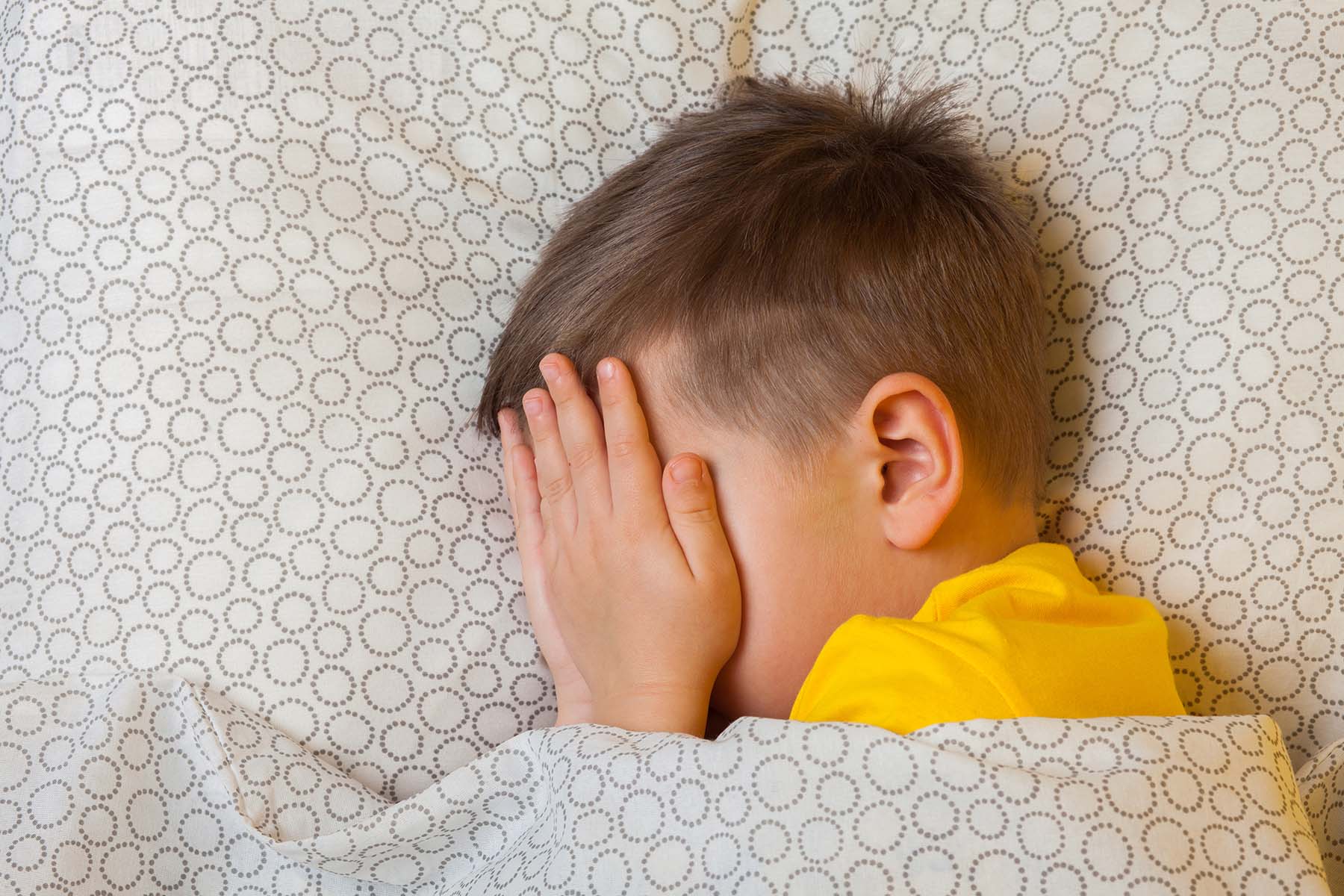Why is My Kid Wetting the Bed?

Key Takeaways:
- Occasional or persistent bedwetting after age 5 can be triggered by emotional stress or by a variety of medical conditions.
- Your child’s pediatrician can conduct a physical exam, analyze bloodwork and/or a urine sample to help determine the cause of age-inappropriate bedwetting.
- Effective treatments and therapies are available, and effective behavioral changes can help reduce bedwetting episodes.
Most kindergarten-aged children don’t want to admit to wetting their bed. But, more than 15% of all five-year-olds occasionally don’t realize their bladders are full until they wake up in wet pajamas. If you’re concerned about your child’s bedwetting — and it’s creating nighttime anxiety and preventing them from enjoying sleepovers — it’s important to figure out the cause. Then you can address it together and help your child wake up dry and confident.
Because all kids are different and some take longer than others to toilet train, children aren’t considered to have nighttime incontinence (also called nocturnal enuresis) until they’re at least five years old.
“If your child has never had good bladder control (a condition called primary enuresis), the first thing to do is get a medical evaluation to determine whether there is a medical cause,” says Alan Delamater, Ph.D., a clinical pediatric psychologist with the University of Miami Health System. “There may not be any medical issues. But, before beginning behavioral treatment, that must be determined.”
When to consult a doctor for bedwetting
If your child’s bedwetting continues past age 5 at least twice a week for three months or more, speak with your primary care physician. When a child has no nighttime accidents for six months or longer, then suddenly starts wetting the bed again, “this is called secondary enuresis, which can be a sign of a greater issue, and should be evaluated by your primary doctor,” says Andrea Assantes, M.D., a pediatrician with UHealth.
“Urinary elimination (both daytime and nighttime) should be discussed at all wellness checks so you can gain an understanding of what’s considered normal for your growing child,” Dr. Assantes says.
Medical bedwetting causes
Your pediatrician can determine if your child has any of the following medical bedwetting causes:
- anatomic abnormalities or birth defects (such as spina bifida)
- urinary tract infection
- bladder/kidney disease
- genetics (runs in the family)
- small bladder
- neurological disease
- seizures
- diabetes
- sleep apnea
- constipation
- hormonal changes or insufficiencies
- bladder contraction before it’s full
- developmental delay
Psychological factors in child bedwetting
Once you’ve effectively treated or ruled out an underlying medical problem, yet your child’s bedwetting continues, a pediatric psychologist can help determine and address the cause.
The following behavioral and emotional issues can trigger sudden or persistent bedwetting:
- diet (caffeine, acidic juices)
- uncompleted toilet training
- poor development of brain-bladder connection
- doesn’t recognize full-bladder sensations
- drinking too much before bedtime
- not emptying bladder before bedtime
- stress, anxiety
- trauma
When a child has primary nocturnal enuresis and is unable to consistently wake up dry after age 5, it’s likely that they are delayed in developing the brain-body connection needed to control their bladder and recognize when they need to use the bathroom, says Dr. Delamater.
He says secondary nocturnal enuresis (a sudden return to wetting the bed) “is usually associated with some stressor (such as changes at home, school, friendships, or loss of loved ones). Kids who have experienced trauma (like a car accident, violence, or abuse) and have developed PTSD may regress in their developmental skills.”
Bedwetting treatment options
Pediatric psychologists and pediatricians agree that it’s essential for parents to respond thoughtfully, skillfully and patiently to their child’s bedwetting — regardless of the cause.
“Kids may often experience stress and anxiety as a consequence of their bedwetting, related to how their parents respond to it (e.g., scolding their child),” Dr. Delamater says. This added stress can only worsen the bedwetting and possibly make the child feel shame and embarrassment.
To help establish the brain-bladder connection for children with primary enuresis without a medical issue, he says, “the key is to engage and motivate the child and help the parents and the child have a different view of the issue.”
Positive-reinforcement encourages more dry mornings.
If your child is able to “hold it” throughout the night for six months or longer, but then returns to bedwetting, address any acute emotional issues first. Then the following incentive program can reinforce motivation for dry nights.
- Never scold or punish your child for wetting the bed.
- When they tell you that they’re wetting the bed again, or you discover soiled bedding or pajamas, “talk to them about what is going on and be sensitive to their feelings,” Dr. Assantes says. “Have them help with changing the sheets.”
- On mornings when they wake up to a dry bed, offer encouragement and praise.
- “Keep track of dry nights and provide tangible, meaningful rewards to the child after reaching goals (e.g., five dry nights, then later seven dry nights in a row),” says Dr. Delamater.
“With this approach, almost all kids will fairly quickly begin to attain nighttime control,” he says. “They will eventually outgrow this problem without treatment, but dry-bed training will hasten their developmental success and has an excellent ‘cure’ rate.”
When managing nighttime incontinence in kids, it’s also helpful to:
- gradually increase time between daytime visits to the toilet (most suitable to improve overactive bladder control)
- reduce the child’s fluid intake after dinner
- establish a consistent bedtime
- have them empty their bladder in the toilet as part of their bedtime routine
Urgency containment exercises
With this treatment approach, the child learns and practices exercises to strengthen the muscles that control the flow of urine (sphincters). Speak to your pediatrician about age-appropriate bladder-control exercises.
Have you tried a bedwetting alarm?
“Sometimes a urine sensor and alarm (a strip that can be inserted into underwear or a pad the child sleeps on) can be used as part of the overall dry-bed training,” Dr. Delamater says.
With this tool, moisture triggers a vibrating or auditory alarm to wake the child, so they can get up to use the toilet. Eventually, the child’s brain associates the alarm notification with their need to urinate.
Dr. Assantes says a bedwetting alarm is appropriate only for older children who are developmentally ready to actively participate in their bladder-control treatment plan. “Success averages above 50%,” she says. Dr. Delamater adds that this training approach is effective only when parents actively participate because they may need to use the alarm for many weeks.
Is medication appropriate?
Medications like DDAVP and desmopressin may help temporarily resolve problematic bedwetting, but the condition will return when the child stops taking the drugs.
“I have prescribed DDAVP for short-term periods like a sleepover or camp. If longer durations of control are being considered, I enlist the help of my nephrology colleagues,” Dr. Assantes says. “Both of these medications can have side effects, and it’s important to talk to your doctor regarding the pros and cons for your child,” in addition to non-pharmaceutical treatment options.doctor regarding the pros and cons for your child,” in addition to non-pharmaceutical treatment options.
References
“Overview: Bedwetting” published on Germany’s national health information website, Institute for Quality and Efficiency in Health Care and republished by the U.S. National Institutes of Health: https://www.ncbi.nlm.nih.gov/books/NBK279494/
UHealth condition and treatment information – “Incontinence, Bedwetting, and Toilet-Training Problems”: https://umiamihealth.org/treatments-and-services/pediatrics/developmental-and-behavioral-health-(pediatrics)/incontinence-bedwetting-and-toilet-training-problems
Dana Kantrowitz is a contributor for UHealth’s news service.
Last reviewed in February 2025 by pediatrician Andrea M Assantes, MD, and psychologist Alan M Delamater, PhD, both with the University of Miami Health System.
Originally published on: March 02, 2023
Tags: amounts of urine, bedwetting causes, behavioral health, children who wet the bed, Dr. Alan Delamater, Dr. Andrea Assantes, pediatric care in Miami, sleep patterns


